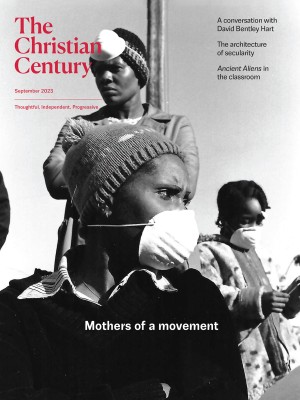
Illustration by Volodymyr Hryshchenko on Unsplash
When it comes to the work of shaping Christian community, words and phrases matter. How people come together, stay together, and live expressively depends on language that inspires belonging and faith. Some words and phrases do this well; others miss the mark so considerably that I sometimes think they should be banished from a congregation’s vocabulary. The congregation I serve doesn’t publish a list of its own banned words. But we make an effort to avoid certain words and phrases that might otherwise get misused. (This is an internal cultural commitment of ours, by the way, not a printed rule.) Here’s a sampling of our prohibited words.
Visitor. Nobody entering a church deserves to be labeled a visitor. Newcomers may be guests in the house of the Lord, but they’re not visitors. Visitors are people who sit on makeshift bleachers in high school football stadiums, looking up at impressive crowds across the field whooping it up. In most settings, visitors hold second-class citizenship. They’re made to feel as if they don’t know or have certain secrets that others know and have. I remember walking into an unfamiliar church with my wife one time and being accosted by a greeter who zeroed in on us like a heat-seeking missile. Determined to pin a carnation on each of us, she was unaware that we weren’t interested in that song and dance. All we wanted was to be received quietly as her equal—two individuals arriving with faith, depth, complexity, and as many life experiences as her own. The next time you invite people to dinner, try to think of them as guests—not visitors—and you might just end up being the host they need you to be.
Read our latest issue or browse back issues.
Attending church. Organizations that survey religious practice often chart trends of people attending worship. But when you attach yourself to a faith community, you’re not an attendee. Rubbing shoulders with people with whom you may have nothing in common except your humanity and God, but whom you’re willing to let impact the shape and substance of who you are, means it’s time to speak of belonging. I wonder if people who talk of attending their church for years have yet to discover the beauty and significance of belonging.
Family. It’s great to have ministries that serve families, but try not to speak of your congregation as a family. No matter how intimate your faith community is, you don’t want it to be a family. That metaphor doesn’t work. Families are closed social units. Remember that first introduction to the relatives of someone you love or loved? No matter how confident you were, or how warm and genuine that family was, some part of the early encounter was awkward, intimidating, or uncomfortable. That’s because families have scores of customs and conventions that aren’t always obvious or welcoming to newcomers. Scripture reminds us that Jesus broke the hearts of many first-century families as he called people out of their families into a larger life.
Taking the collection. The moment in worship when people offer up a gift of value from their life is called the offering, not the collection. For millennia, people have made material and spiritual offerings in devotion or gratitude to God. We may receive such gifts during worship on behalf of God, but we don’t collect them. How would one even collect the gift of a beautiful offertory sung by choir members giving their best? Offerings are given and received.
I could go on, but I will spare you. Wait, just one more: Join us for . . . This no-no is an easy slip that creeps into announcements. Unless you’re cultivating clubbiness, try a more open invitation for all to join in an activity.






